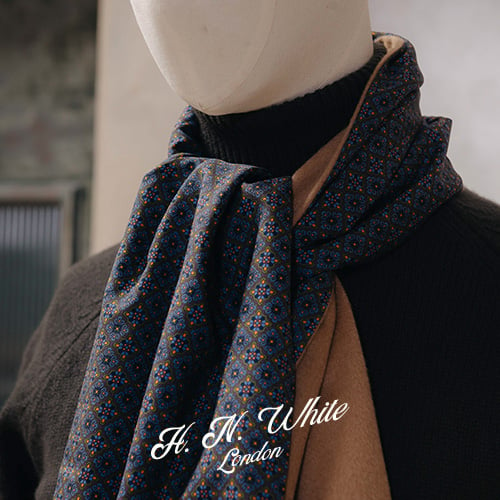The video above shows the key aspect of quality control at most weaving houses. Workers quickly scan the cloth for faults, then either snip off the stray end or – much more laboriously – manually reweave the thread back in.
The latter is a intricate and absorbing process. Although done at speed, a worker can’t miss a single error and has to concentrate in a very different way from the people staffing the looms, warping machines and other mechanicals around them. And block out all the noise.
Perhaps surprisingly, quality control is often a key thing that separates luxury producers from more run-of-the-mill manufacture (no pun intended). They put so much emphasis on quality that they can’t afford to make a mistake. And the cost of the raw materials is a big factor – if the ultra-fine cashmere is worth a hundred pounds per metre, it’s worth someone spending a long time repairing it.
The second video, below, shows a very different process: automated embroidery machines (both are from Begg scarves, Ayr). Interestingly, the two processes could not be more different in their application, yet are the most efficient means to do their job.
This is key for me: as discussed at length on the Sunspel post, quality is what I care about most, and I have no patience for brands that push the age or beauty of their processes, yet will not discuss their efficacy. If the same shape could be achieved in the chest of a bespoke suit by machine-padding it, I’d prefer that. If a machine-sewn buttonhole were more attractive and longer-lasting, ditto. A few years ago a machine was launched that could link the toe of a sock just as well as by hand; yet some brands still emphasise the fact that their socks are ‘hand-linked’.




























Simon, one of the best coatmakers in Savile used to machine-pad the chest, collar and lapels. His work was outstanding, but the coats were much stiffer than those sewn by hand.
Aside from the technical benefits of hand-work, many people do appreciate a garment having a soul. The human touch. Many bespoke clients love that element. The linings and ‘pointless’ top-stitches on your Cifonelli overcoat can all be done by machine, of course.
It sometimes defies logic, but the human touch still means a lot to those who find machines and robotic manufacture rather soul-less.
Not my point of view, but thanks Mac.
On the other points, the top stitching can’t be done the same way on a lot of Cifonelli work, eg around the cuff on my overcoat. And the hand workin often more beautiful – I have no problem with that.
Lastly, you can’t get the same amount of 3d shape on a machine-padded chest. I’ve watched a few on the Row try to demonstrate.
Yes exactly, there’s no substitute for handwork on some things. I say long may that be so! In most cases, it’s a combination of man and machine (including bespoke suits and shoes) that gives the best quality. Increasing the amount of automated work often means sacrificing quality for profits.
I have just taken delivery of an unwashed kishorn and you can genuinley tell the quality and work that is in it. The fine cashmere is amazing. It is so thin it does not look like cashmere, more like a silk but when you wear it you still get the warmth and comfort without the bulk.
Simon, I really struggle to believe you are fully behind this sentence:”If the same shape could be achieved in the chest of a bespoke suit by machine-padding it, I’d prefer that”. You would prefer machine stitching over the excessive handstitching on your Cifonelli suits …
If the effect were exactly the same, yes – functionally and aesthetically
Strange that we all have different interests within the realm of bespoke.
I do love to meet the people who make the stuff, so in some nebulous way I feel more connected to the garment if it is more ‘hand made’ than a garment produced on a more mechanised production line. A production line garment can be perfectly executed of course, so it’s all dependent on just what it is that is drawing you to bespoke. In all honesty many ‘normally shaped’ guys can easily get away with RTW and a few tweaks at their local dry cleaner nowadays in any case.
Having said all that though, I am perhaps the odd one out though within this niche of bespoke, as I have pretty much zero interest in handmade or Milanese buttonholes or whatever, if it’s an extra option for let’s say £20 ok, I’d say do it, but the idea of it being a “selling point’ in anyway that apparently makes one tailor superior to another and therefore £1k more expensive… I don’t get that really.
I believe a lot of those things are arguably nothing more than fetishisizations which mean nothing to anyone but the wearer as they are ultimately unknowable to a general audience. (i.e. the people who will see you wearing the suit).
J, why bother with a bespoke suit? It looks better, of course. It’s the same with hand-sewn button-holes. They look much nicer. Machine-made holes look cheap (to an experienced eye) and are the same as on a R-T-W suit. If you’re paying anything over £2000 for bespoke they should be expected.
If you’re happy with your suits that’s the main thing. The rest is about affordability. I really don’t accept ‘fetishization’ as the reason for having hand-made button-holes!
Worth considering:
Quality does not always trump fit, comfort and/or style. Because you mentioned Sunspel, I have to cite an item in March Town&Country: a blind test of the best plain white T-shirt. Among the 25 considered, it wasn’t Sunspel, but rather one from one of the most ubiquitous stores worldwide.
Are J. Adler shoes hand stitched? It’s hard to imagine a machine achieving such a high level of imperfection.
Nope
Hi Simon,
Frankly, I greatly appreciate this kind of post too. This sort of information you have been providing for PS readership, on how high quality items are still produced today has become of the highest importance .
So, thanks.
John
Simon
Have you ever heard of the sicilian tailors? I’m talking about Zacco, Guido Davì, Giuffrida, Caponetto? Sicilian tailoring is very similar to neapolitan so very light fabrics, little to no padding on the shoulder, soft construction,etc…
I have seen them and their work, yes. I haven’t had anything made though
Do you know somebody who had a jacket made from Guido Davì or Zacco?
Or have you read the sleevehead book?
I can’t remember which tailors it was off the top of my head I’m afraid
Simon
Where in the world can I find a pair of plain white cotton tennis shorts… No one seems to make them any more! Where do you find your active wear?
George
I agree, it would be nice to have some (without a pony or a crocodile…)
I wear Orlebar Brown jersey shorts and their pique polo shirts for tennis etc: http://www.permanentstyle.com/2012/06/the-perfect-polo-shirt-orlebar-brown.html
Simon
I noticed you have a bit of roped shoulder ( no offence intended, I have too) and like jackets with natural shoulders. Don’t you think you could benefit from a little more structured shoulders?
I’m not sure what you mean by having a roped shoulder. Do you mean a sloping shoulder?
If so, you probably want this post: http://www.permanentstyle.com/2011/08/nothing-wrong-with-sloping-shoulders.html
What do you mean by their jersey shorts?
Thanks
G
Grey cotton shorts – I think they’re a jersey material, or they might just be loopback
Ok thanks Simon
I must admit I’m a bit more formal than the ‘sweats’ type material and am more looking for the type of thing Fred Perry and Lacoste would have worn (despite neither of these brands selling such shorts). The hunt continues or I will have to get some made!
Great videos – rather hypnotic to watch!
I also think this post nicely captures that essence of what many commentators in the Sunspel article were getting at: there’s nothing inherently better about a product made in England (or Scotland, or Italy) but, where a company has chosen to do so, there must be some reason they are prepared to pay much higher labor costs when there are cheaper options abroad.
In the case of Begg, they use mechanization where appropriate (i.e. where it creates the highest quality product) and yet they still do this in Scotland even though, in theory, they could outsource this process to somewhere overseas with lower costs. Assuming it’s not just a question of inertia or obsession with tradition (Begg runs a profitable business after all) there must be some benefit to local manufacture. Perhaps it’s higher quality materials, or more stringent quality controls – I’d certainly be interested to hear the perspective of other British based manufacturers like Smedley, that also have a lot of mechanization.
Given this, and assuming such brands are rational in their decisions, I’d say it’s reasonable for people to believe that products made in Britain (or other first world countries) are better quality precisely because the manufacturer deemed it worthwhile to pay the higher labor costs in return for whatever benefits that might yield.
It’s true, though a huge amount of it is the inertia of labour force